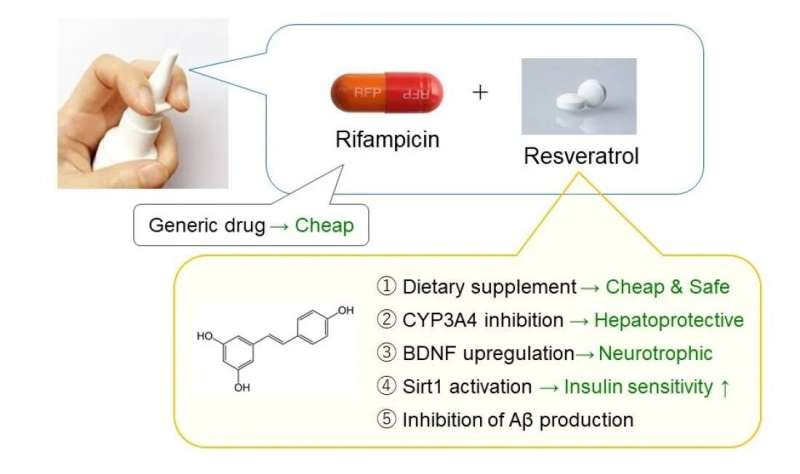
Dementia is thought to occur when proteins called amyloid-β, tau, and α-synuclein accumulate in the brain and form oligomers. A research group from the Department of Translational Neuroscience, Osaka City University Graduate School of Medicine, had previously shown in a study using mice that the antibiotic rifampicin removes oligomers from the brain and improves cognitive function. However, the drug has been associated with side effects such as liver damage. Resveratrol, a naturally occurring antioxidant in plants, is used as a supplement in Europe and the United States. “To combat the negative side effects of the existing drug rifampicin, we thought of combining it with the hepatoprotective effects of resveratrol,” says Professor Takami Tomiyama, who acted as lead investigator for the current study.
This time, the research group administered a fixed dose combination of rifampicin and resveratrol intranasally five days a week for a total of four weeks to mice models of Alzheimer’s disease, frontotemporal dementia, and dementia with Lewy bodies, and observed their cognitive functions and brain pathology. The results showed that the combination significantly improved the cognitive function of the mice, inhibited the accumulation of oligomers, and restored synaptophysin levels—presynaptic proteins that facilitate synapses. Additionally, blood levels of liver enzymes, a marker of hepatic damage that normally increases with rifampicin, remained normal in the fixed-dose combination. Furthermore, increased levels of brain-derived neurotrophic factor (BDNF) expression were observed in the hippocampus, which was not seen with rifampicin alone. These results indicate that this fixed-dose combination is superior to rifampicin alone in terms of both safety and efficacy.
The results of this study were published online in the Swiss scientific journal Frontiers in Neuroscience on December 13, 2021.
“The number of patients with dementia has been increasing all over the world, with some sources predicting a doubling of patients every 20 years. However, there is still no effective treatment for the disease,” says Specially Appointed Lecturer Tomohiro Umeda, first author of the study. “Recent studies have shown that abnormalities begin to appear in the brains of dementia patients more than 20 years before the onset of the disease.” By investigating new therapeutic purposes with existing drugs in a process called drug repositioning, the research team hopes to diagnose and prevent dementia before the neurons start dying.
Source: Read Full Article
